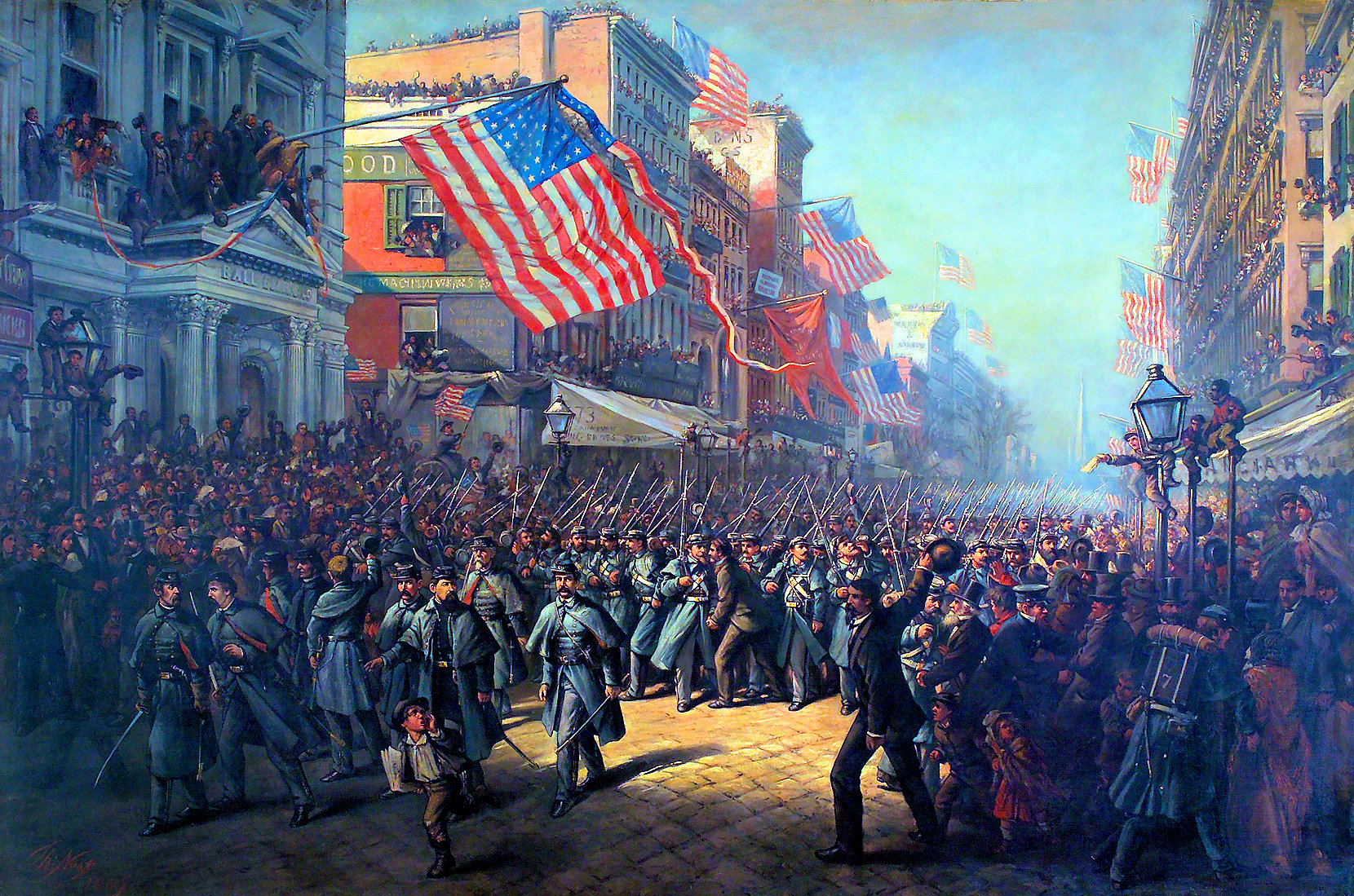“New Yorkers cheered and applauded as the Silk Stocking Regiment marched through the city. The line of march was a perfect ovation. Thousands upon thousands lined the sidewalks. It will be remembered as long as any of those who witnessed it live to talk of it, and beyond that it will pass into the recorded history of this fearful struggle,” the author of the Third Annual Report of the Bureau of Military Statistics of the State of New York remembered in 1866.
American Civil War Chronicles
I found this post in the worst possible condition for hostilities
April 19, 2021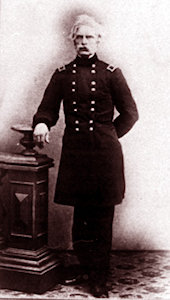
HEADQUARTERS DEPARTMENT OF FLORIDA,
Fort Pickens, April 19, 1861.
Lieut. Col. E. D. KEYES, Secretary to the General-in-Chief Washington, D. C.:
COLONEL: I respectfully report for the consideration, and I hope for the approval, of the General-in-Chief the reasons inducing me to urge on Captain Meigs and Lieutenant Porter a delay in forcing an entrance into the harbor of Pensacola. Aware of the desire of the Government that a ship should be placed there, and knowing that I was opposing the wishes of Captain Meigs, nothing but a profound sense of its necessity would have induced interference on my part; but, believing if the actual state of this post at this time were known that no such instructions would have been given, I did not hesitate to express my views and wishes in the case.
As I have already reported to you, I found this post in the worst possible condition for hostilities—the batteries out of order; some of the largest and most important guns dismounted; the necessary traverses and other protections for the troops unprepared; the garrison deficient; the subsistence nearly exhausted; the ammunition (except powder) not sufficient in important articles for one day’s service; a total want of Engineer, Quartermaster, and Ordnance tools and implements, and the fort in a complete state of confusion, all requiring the labor of every man in it; the steamer Atlantic lying here with large supplies of indispensable stores, which can only—without extreme inconvenience, involving great time and labor—be landed within range of the guns of Fort McRee, and the vital importance of getting these stores ashore, rendered, in my judgment, delay in encountering hostilities of the utmost importance, and any act of ours provoking, or I may say assuredly and certainly causing it, to be premature and unwise. [continue reading…]
Attack on the Massachusetts 6th at Baltimore
April 19, 2021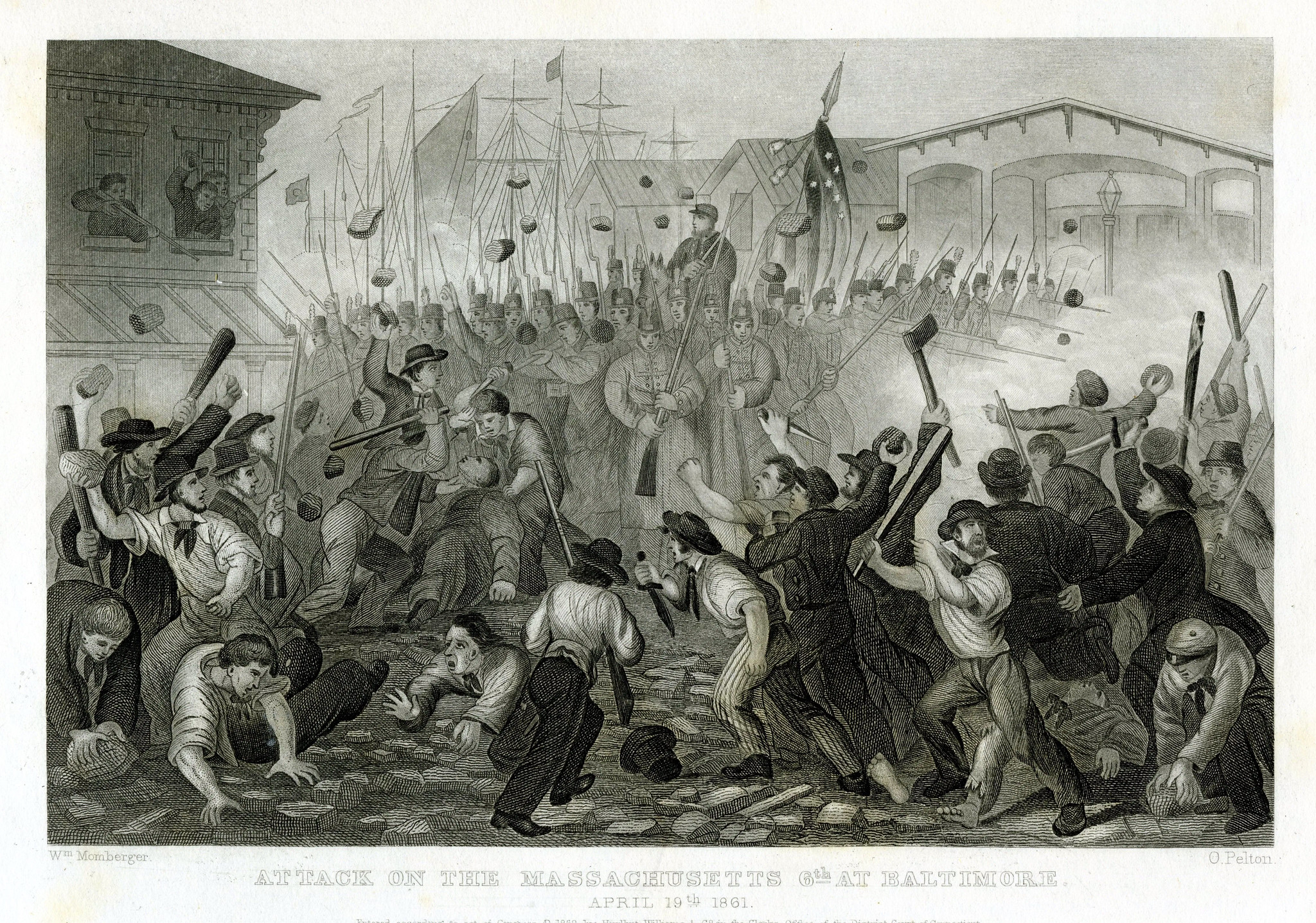 Title: Attack on the Massachusetts 6th at Baltimore, April 19, 1861
Title: Attack on the Massachusetts 6th at Baltimore, April 19, 1861
Date Created/Published: c1862.
Medium: 1 print : steel engraving.
Summary: Men fighting with guns, clubs, stones, etc.
Reproduction Number: LC-USZ62-56105 (b&w film copy neg.)
Rights Advisory: No known restrictions on publication.
Call Number: LOT 4416 B (1861) [item] [P&P]
Repository: Library of Congress Prints and Photographs Division Washington, D.C. 20540 USA
Notes:
Steel engraving by O. Pelton after William Momberger.
Copyright by Hurlbut, Williams & Co.
This record contains unverified, old data from caption card, with subsequent revisions.
Caption card tracings: Civil War Troops Mass.; US Hist. 19 April 1861 (B- riot); Artists, Publ. I. (2); Shelf.
Library of Congress: (medium resolution) https://www.loc.gov/pictures/item/2004680236/
Higher resolution, cleaner version from Wikimedia Commons: https://commons.wikimedia.org/wiki/File:6th_Massachusetts_Militia_attacked_in_Baltimore_1861.jpg
Report of G.V. Fox—Nearing the bar it was observed that war had commenced, and, therefore, the peaceful offer of provisions was void.
April 19, 2021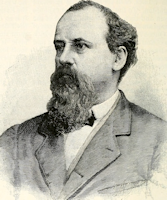
STEAMER BALTIC,
New York, April 19, 1861.
SIR: I sailed from New York in this vessel Tuesday morning, the 10th instant, having dispatched one steam-tug, the Uncle Ben, the evening previous to rendezvous off Charleston. The Yankee, another chartered tug, followed us to the Hook, and I left instructions to send on the Freeborn.
We arrived off Charleston the 12th instant, at 3 a.m., and found only the Harriet Lane. Weather during the whole time a gale. At 7. a.m. the Pawnee arrived, and, according to his orders, Captain Rowan anchored twelve miles east of the light, to await the arrival of the Powhatan. I stood in with the Baltic to execute my orders by offering, in the first place, to carry provisions to Fort Sumter. Nearing the bar it was observed that war had commenced, and, therefore, the peaceful offer of provisions was void.
The Pawnee and Lane immediately anchored close to the bar, notwithstanding the heavy sea, and though neither tugs or Powhatan or Pocahontas had arrived, it was believed a couple of boats of provisions might be got in. The attempt was to be made in the morning, because the heavy sea and absence of the Powhatan’s gunboats crippled the night movement. All night and the morning of the 13th instant it blew strong, with a heavy sea. The Baltic stood off and on, looking for the Powhatan, and in running in during the thick weather struck on Rattlesnake Shoal, but soon got off. The heavy sea, and not having the sailors (three hundred) asked for, rendered any attempt from the Baltic absurd. I only felt anxious to get in a few days’ provisions to last the fort until the Powhatan’s arrival. The Pawnee and Lane were both short of men, and were only intended to afford a base of operations whilst the tugs and three hundred sailors fought their way in.
However, the Powhatan and tugs not coming, Captain Rowan seized an ice schooner and offered her to me, which I accepted, and Lieutenant Hudson, of the Army, several Navy officers, and plenty of volunteers agreed to man the vessel, and go in with me the night of the 13th. The events of that day, so glorious to Major Anderson and his command are known to you. As I anticipated, the guns from Sumter dispersed their naval preparations excepting small guard-boats, so that with the Powhatan a re-enforcement would have been easy. The Government did not anticipate that the fort was so badly constructed as the event has shown.
I learned on the 13th instant that the Powhatan was withdrawn from duty off Charleston on the 7th instant, yet I was permitted to sail on the 9th, the Pawnee on the 9th, and the Pocahontas on the 10th, without intimation that the main portion—the fighting portion—of our expedition was taken away. In justice to itself as well as an acknowledgment of my earnest efforts, I trust the Government has sufficient reasons for putting me in the position they have placed me.
I have the honor to be, your obedient servant,
G. V. FOX.
The Baltic has been chartered for one month.
Hon. SIMON CAMERON,
Secretary of War, Washington.
Map Showing Route Between Camden Street Station and President Street Station through Baltimore
April 19, 2021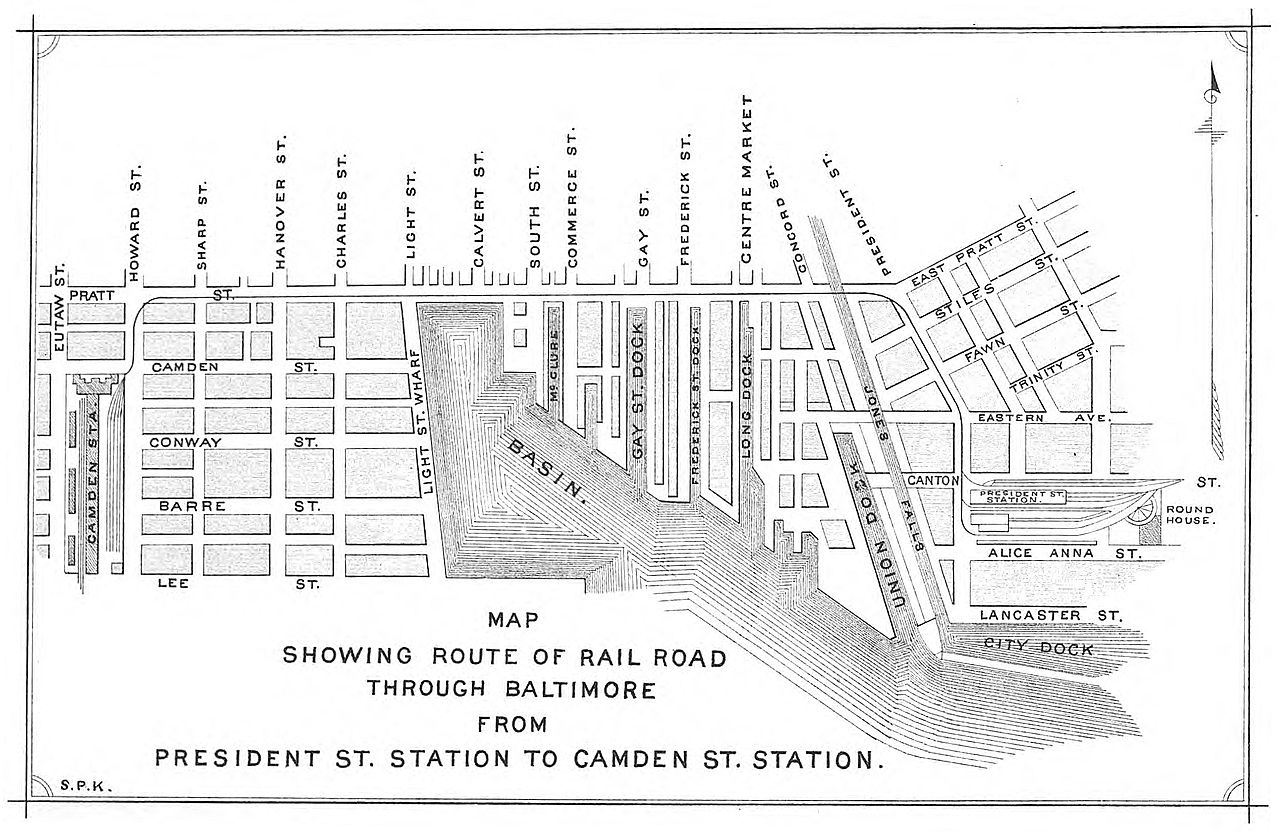 The map shows the Pratt Street railroad route taken by Union troops between Camden Street Station and President Street Station through Baltimore, Maryland on April 19, 1861.
The map shows the Pratt Street railroad route taken by Union troops between Camden Street Station and President Street Station through Baltimore, Maryland on April 19, 1861.
While enroute to Washington, D.C., the troops were attacked by Confederate sympathizers during the the Baltimore riot of 1861.
Major Anderson has just arrived.—Band playing, colors flying, men’s voices cheering lustily, and everywhere hats tossed up and handkerchiefs waving–it was an enthusiastic and delightful tribute!
April 19, 2021
Abby Howland Woolsey to Eliza Woolsey Howland.
April 19, 1861.
My Dear Eliza: Your’s and Joe’s note and the box of birthday flowers for Charley came yesterday morning, and the latter we have all had the benefit of. Charley did not want to give any away, so we used them for the dinner-table and parlor, and looked and smelled “lovely” last night when we entertained eight young men callers. Charley did not have any of his friends to dinner or supper. On Wednesday he said he should keep his birthday on Thursday, and on Thursday he said he had kept it the day before. I think he preferred not having any special celebration this year. Meantime, the candy pyramid stands untouched, consolidating gradually into a huge sugary drop. The city is like a foreign one now; the flag floats from every public building and nearly every shop displays some patriotic emblem. Jane amused herself in shopping yesterday, by saying to everyone: “You have no flag out yet! Are you getting one ready?” etc. Shopkeepers said in every instance: “No – well– we mean to have one; we are having one prepared,” etc. She met Mr. Charles Johnson, of Norwich, who had been down to see the Massachusetts contingent off –a splendid set of men – hardy farmers, sailors from Marblehead, some in military hats, some in fatigue caps, some few in slouched felts – all with the army overcoat. C. J. had a talk with some of them in their New England vernacular, which he described as very funny, “thought there might be some fightin’, but by golly! there’s one thing we want to do–a lot of us–just pitch into an equal number of South Carolinas.” C. J. says a few gentlemen in Norwich came in to the “Norwich Bank” to his father and authorized him to offer Governor Buckingham $137,000 as a private subscription. This is beside the $100,000 offered by the other bank the “Thames.” [continue reading…]
First Blood—The Sixth Massachusetts Regiment Fighting their way through Baltimore, April 19, 1861
April 19, 2021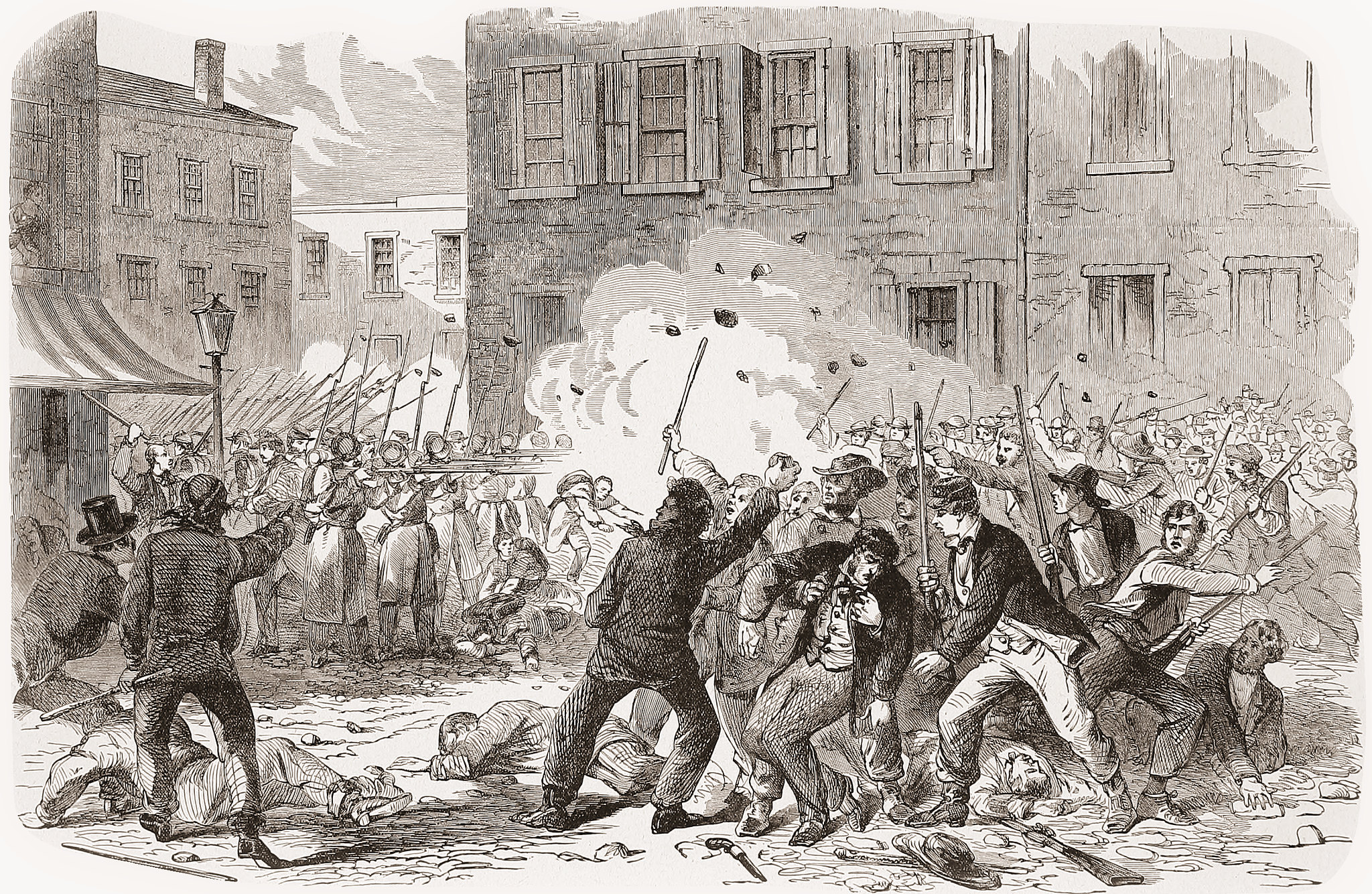
Note: While the title in the referenced book is the same as one used in the May 4th, 1861 issue of Harper’s Weekly, the image used differs between the two.
Harper’s Pictorial History of the Civil War by Alfred H. Guernsey and Henry W. Alden; copyrighted 1866 by Harper and Brothers; 1894 by Alfred H. Guernsey and Henry W. Alden; 1894 by McDonnell Bros; pub. The Puritan Press Co.; Chicago, Illinois
First Blood—The Sixth Massachusetts Regiment Fighting their way through Baltimore, April 19, 1861
April 19, 2021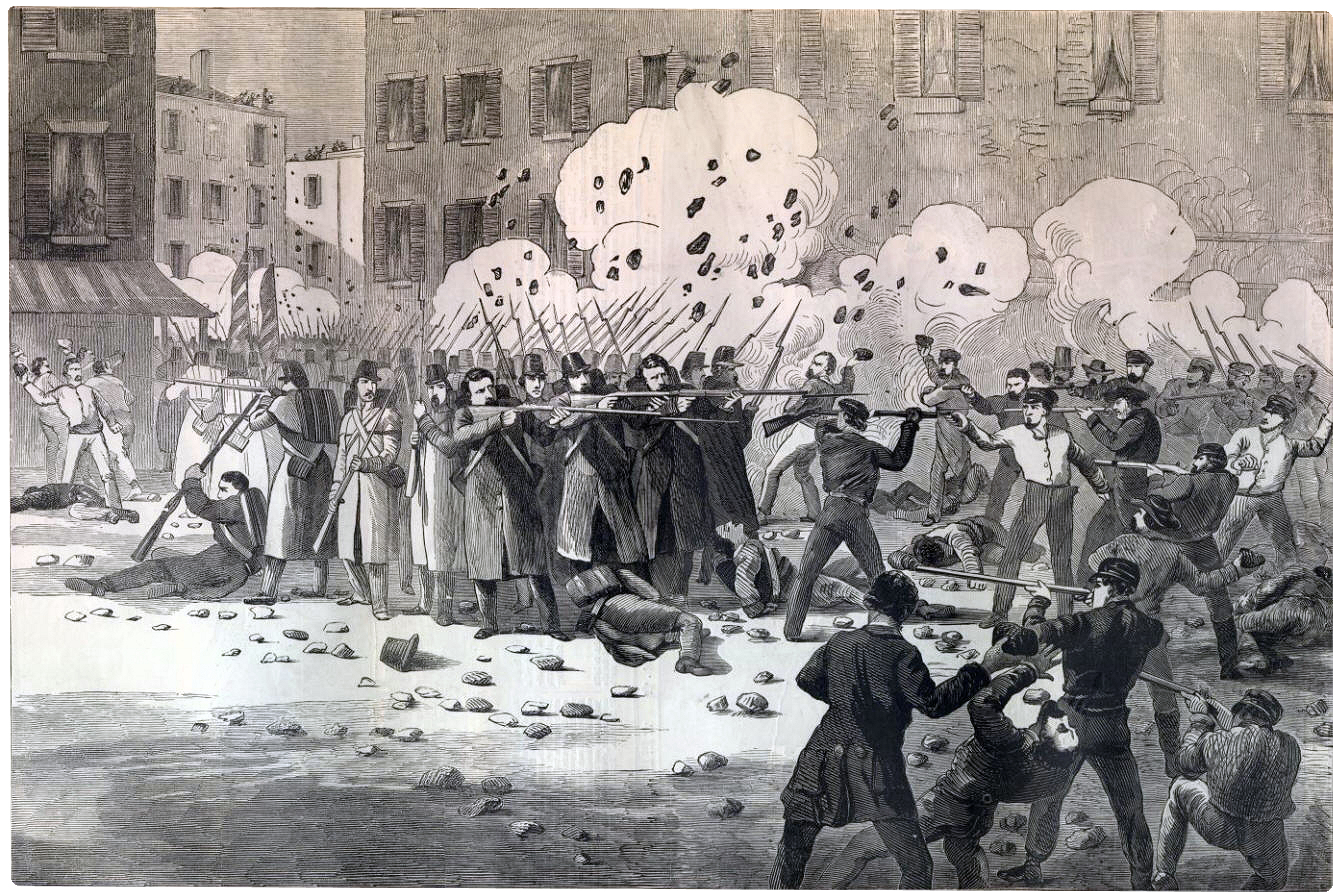
Harper’s Weekly, May 4, 1861
Note: This article is posted on the 160th anniversary of the event being reported rather than the anniversary of the article. (Usually, articles are posted here 160 years after original publication.)
On page 283 we publish an illustration of the First Blood—viz., the conflict between the Baltimore mob and the Massachusetts regiment on 19th April. The Baltimore Sun of April 20 says :
“Yesterday morning the excitement which had been gradually rising in this city for some days, with reference to the passage of Northern volunteer troops southward, reached its climax upon the arrival of the Massachusetts and other volunteers, some from Philadelphia, at President Street depot, at half past ten o’clock. A large crowd had assembled, evidently to give them an unwelcome reception.
” Six of the cars had succeeded in passing on their way before the crowd were able to accomplish their purpose of barricading the track, which they now began to effect by placing large, heavy anchors, lying in the vicinity, directly across the rails. Some seven or eight were borne by the crowd and laid on the track, and thus the passage of the cars was effectually interrupted.
“Having accomplished this object, the crowd set to lustily cheering for the South, for Jefferson Davis, South Carolina, and secession, and groans for sundry obnoxious parties. In the mean while, the troops thus delayed at the depot remained quietly in the cars until tired of their inaction, and apprehending a more formidable demonstration, they came to the conclusion to face the music and march through the city.
“They accordingly evacuated the cars, and rapidly gathering on the street north of the depot, formed in line and prepared to make the attempt. The word was given to ‘march,’ and the head of the line had advanced some fifteen paces, when it was driven back upon the main body by the immense crowd, still further increased by a body of men who marched down to the depot bearing at their head a Confederate flag.
” Eight of the cars started from the President Street depot, and six passed safely to the Camden station. The other two soon returned, the track in the mean time having been obstructed at the corner of Pratt and Gay streets by anchors, paving stones, sand, etc., being put on it by the crowd. Attempts had previously been made to tear up the track, but the police by strenuous efforts prevented it. A cart-load of sand, which was being driven along, was seized and thrown upon the track.
” After considerable delay it was determined to make the attempt to march the remaining troops through the city, only about sixty of whom were supplied with arms. The remainder were recruits, and occupied second-class and baggage cars.
“At the head of this column on foot, Mayor Brown placed himself, and walked in front, exerting all his influence to preserve peace.
“Just before the movement was made from the cars a large crowd of persons went down President Street with a Southern flag and met the troops as they emerged from the cars. The Southern flag was then carried in front of the column, and hooting and yelling began, and as soon as the troops turned out of Canton Avenue they were greeted with a volley of stones.
“At the corner of Fawn Street two of the soldiers were struck with stones and knocked down; one of them was taken by the police to the drug store of T. J. Pitt, at the corner of Pratt and High streets, and the other to the eastern police station.
“The yelling continued, and the stones flew thick and fast. At Pratt Street bridge a gun was fired, said by policeman No. 71 to have been fired from the ranks of the soldiers. Then the crowd pressed stronger, until the body reached the corner of Gay Street, where the troops presented arms and fired. Several persons fell on the first round, and the crowd became furious. A number of revolvers were used, and their shots took effect in the ranks. People then ran in every direction in search of arms, but the armories of the military companies of the city were closely guarded and none could be obtained. The firing continued from Frederick Street to South Street in quick succession, but how many fell can not now be ascertained.
“From Gay to South Street, on Pratt, the fight with the soldiers who marched, or rather ran, through the town, was terrific. Large paving stones were hurled into the ranks from every direction, the negroes who were about the wharf in many instances joining in the assault. At Gay Street the soldiers fired a number of shots, though without hitting any one, so far as could be ascertained. After firing this volley the soldiers again broke into a run, but another shower of stones being hurled into the rank at Commerce Street with such force as to knock several of them down, the order was given to another portion of them to halt and fire, which had to be repeated before they could be brought to a halt. They then wheeled and fired some twenty shots, but from their stooping and dodging to avoid the stones, but four or five shots took effect, the marks of a greater portion of their balls being visible on the walls of the adjacent warehouses, even up to the second stories. Here four citizens fell, two of whom died in a few moments and the other two were carried off, supposed to be mortally wounded.
“As one of the soldiers fired he was struck with a stone and knocked down, and as he attempted to rise another stone struck him in the face, when he crawled into a store, and prostrating himself on the floor, clasped his hands and begged piteously for his life, saying that he was threatened with instant death by his officers if he refused to accompany them. He said one half of them had been forced to come in the same manner, and he hoped all who forced others to come might be killed before they got through the city. He plead so hard that no further vengeance was bestowed upon him, and he was taken to the police station to have his wounds dressed. As soon as they had fired at this point they again wheeled and started off in a full run, when some three or four parties issued from the warehouses there and fired into them, which brought down three more soldiers, one of whom was carried into the same store with the one above alluded to, and died in a few moments. The others succeeded in regaining their feet, and proceeded on with their comrades, the whole running as fast as they could, and a running fire was kept up by the soldiers from this point to the depot, the crowd continuing to hurl stones into the ranks throughout the whole line of march.”
“…the danger is a real…, the landing of a considerable body of hostile troops on the shore of that island..,”
April 19, 2021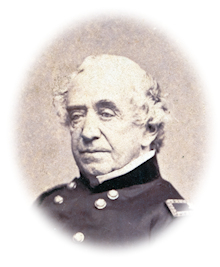
ENGINEER DEPARTMENT,
Washington, April 19, 1861.
Hon. SIMON CAMERON, Secretary of War:
SIR: I inclose the copy of a letter from Captain Hunt, dated Key West, April 11, which you may think advisable to lay before the Secretary of the Navy. I may be permitted to add that the danger is a real one that Captain Hunt specifies, namely, the landing of a considerable body of hostile troops on the shore of that island, out of reach of the guns of Fort Taylor. This the fort and its garrison can in no degree prevent. If landed with heavy artillery this force may reduce the fort by siege, because as yet that part of the structure that is to cover its walls from land batteries has not been built, nor can it be erected so as to fulfill its object for a year or more.
In the mean time complete security may be assured by small, quick-armed steamers stationed at Key West and cruising in its vicinity, provided other demands of the public service will permit the Navy Department to supply such protection.
I have the honor to be, very respectfully, your obedient servant,
JOS. G. TOTTEN,
Brevet Brigadier-General.
![]()
[Inclosure.]
FORT TAYLOR, KEY WEST, FLA., April 11, 1861.
General J. G. TOTTEN, Chief Engineer, Washington, D.C.:
SIR: It will probably be known ere this time if there is reason to anticipate any active demonstration by the C. S. Army to secure possession of this work. With the probability of such an occurrence will come the duty of defeating or preventing it by anticipatory measures. It is not for me to speculate on this probability, but if it does exist it cannot be amiss for me to ask attention to the defensive problem which would then arise. I shall do this, although perfectly aware of your acquaintance with the case, and strongly hoping that a peaceful possession by the United States of this line of keys may be assured. Supererogation can be no crime in this instance.
If there is any likelihood now of a large demonstration to take this place, measures should at once be taken to prevent the landing of forces and munitions on the part of the key beyond the range of Fort Taylor guns. This landing can be made without difficulty unless something more is done, and thus regular siege can be laid to the fort. This ought to be prevented, as it can most readily by maintaining an excess of naval force. The only good landing places not commanded by our guns are along the east portion of the south beach. You will see the landing even of a siege train there would be quite practicable if left undisturbed. But if two or three naval vessels, steamers being best, of course, are stationed along the south beach at points near the shore, say one-half mile, there is enough water, and they could cover all this line by their fires, and could also watch for any rendezvous of an attacking force in the vicinity. The same result can be attained by establishing two or three batteries along that shore and having the forces stationed here increased by several hundred men. The landing of men in boats would be quite practicable with such rapidity as to speedily outnumber the permanent garrison of the key, and, indeed, I see nothing to hinder putting several thousand ashore almost before the landing is suspected. This, however, would be made an entirely fruitless operation if our naval strength and distribution were such as to make the landing of stores and munitions impracticable, and the capture of the transport fleet certain. Along the north side the water is quite shoal, and a landing of men or stores could only be made by boats or scows of light draught, and, indeed, on the south beach scows would be the landing agency for stores.
You will at once see that if we are kept restrained by a superior field force suddenly landed, the debarkation could go on if no naval interference interrupts it. Open batteries could hardly be held against the assault of superior numbers, and might be turned by landing on the north side through Boca Chica or more eastern channels.
Thus, unless we have a force superior to any likely to be landed, open batteries would be rather unsafe reliances. By using abatis, &c., some power of resistance could be given to such defensive batteries, and they might be useful adjuncts. But the best and safest reliance is in a naval cordon and reef cruisers to cut up any expedition by the roots, and forbid it any foothold on this island. Our Navy, being at once available, could crush out any demonstration and annihilate the fleet of transports on which reliance would be placed as the base of operations. The combination of a larger land artillery force with naval strength would be the same basis of defense, and this would afford the needed watch and give a chance of forming a line across the key east of the salt-house. I might discuss the strategy of the case much more, but it can hardly be needful. I should mention that the necessity of using steamers for dispatch boats in case of siege should be duly considered. Without this resource we might be for a long time shut up without information being conveyed. Whether the Havana and New York boats could be relied on then is to be doubted. On the whole, the main question is this: Are we in any danger of siege? If so, landing should be made impracticable or useless by such a concentration of force here as to control the east end of the key or to cut off all chance of landing a siege train and supplies. The attempt to use light-draught steamers to operate out of reach of naval vessels on the north side is to be considered and duly obviated.
I have been obliged to write this in haste. I do not suppose you will need to be reminded of the points considered, but it is better that I should omit nothing which might be thought my duty, should these considerations chance not to have been entertained.
Mr. Mallory wrote here, I have been told, by a recent mail, that when the C. S. Army were ready, an attempt to take these works would be made, but I do not believe this would be tried were our assured strength such as to contest the debarkation.
I am glad to say that from what I have heard to-day the secessionists here have essentially given in and are beginning to see the error of their ways. Judge Marvin has at last been induced, I believe, to hold on to his place, and I trust that all conflict of jurisdictions will now be avoided. It is surmised that Judge McIntosh may conclude not to come here at all.
Very respectfully, yours, &c.,
E. B. HUNT,
Captain of Engineers.
P. S.—Judge Marvin feels sure he will be here by the next boat, April 21. I suppose the shadow of destiny begins to show too clearly for further doubt. I think a turning point is passed, and “submission” to their former peace and quiet will, I hope, replace the rule of bad passions.
The main question is to be decided by the United States once for all, and I do not doubt that this decision is already made.
P. S.—The yellow fever is to be considered in sending men here, acclimation being very important. Crowding a large force on the key will endanger its appearance in a destructive type, and if acclimated crews and troops can be sent this would be a great safeguard.
The Seventh Regiment, N. Y. S. M., Passing Down Cortlandt Street on Their Way to the Pennsylvania Railroad Depot, En Route for Washington, D. C., April 19th, 1861
April 19, 2021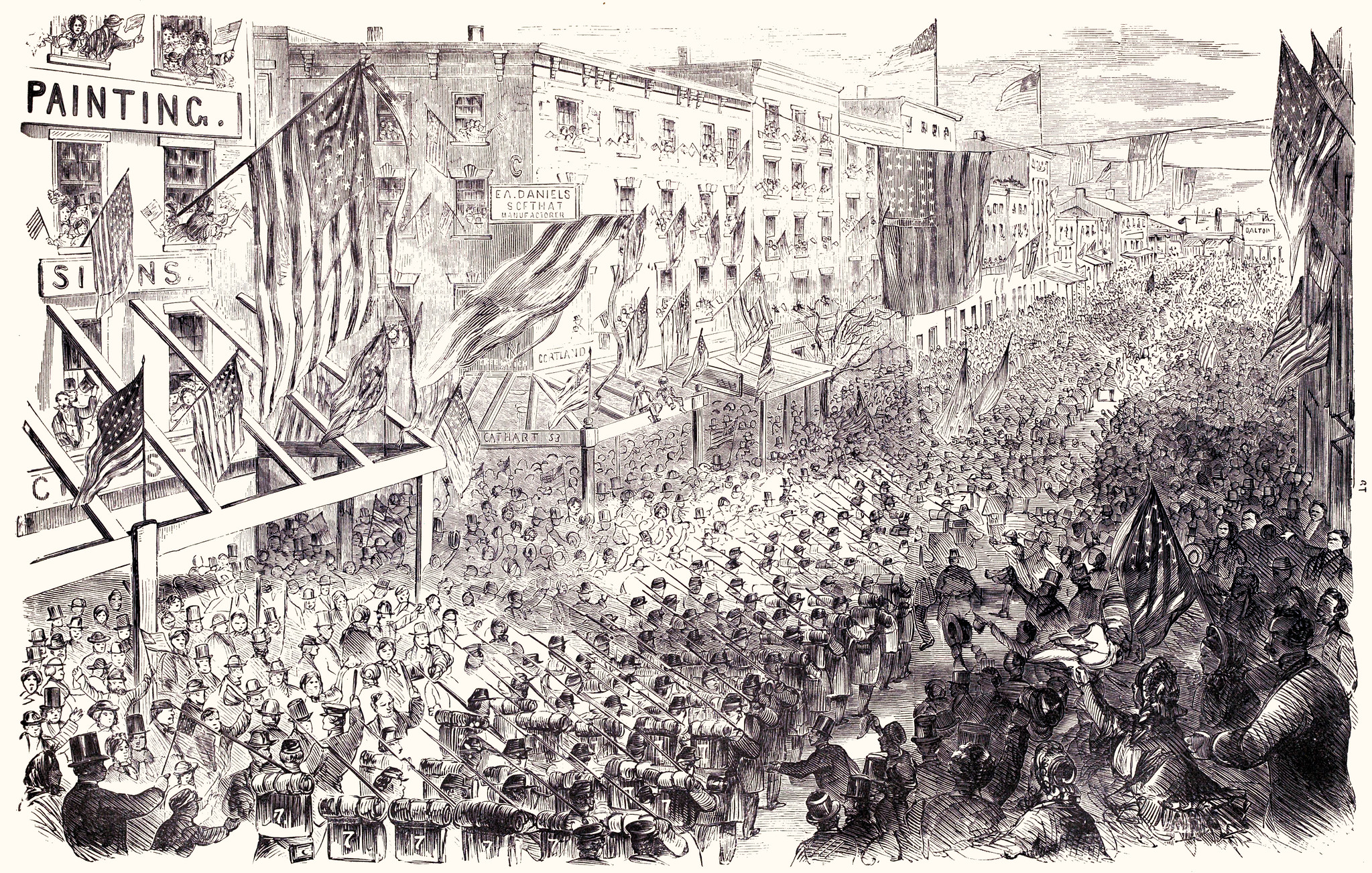 (from Frank Leslie’s Illustrated History of the Civil War…, edited by Louis Shepheard Moat, Published by Mrs. Frank Leslie, New York, 1895)
(from Frank Leslie’s Illustrated History of the Civil War…, edited by Louis Shepheard Moat, Published by Mrs. Frank Leslie, New York, 1895)
From the moment it became known that the pet regiment of New York, the gallant Seventh, was to be the first body of citizen soldiers to leave the city for the war the excitement among tilts people was intense. Early on the morning of April 19th, 1861, there was an extraordinary excitement in the city. Windows along the whole line of march were taken possession of, and groups of people accumulated on the stoops of houses and at the corners of every street. Deafening cheers greeted the soldiers everywhere. During a temporary halt a venerable man rushed in front of the staff, and cried out: “God bless you, boys! Do your duty—fight for your flag!”
Rutherford B. Hayes put his foot down about going into “this movement,” but if the war is to go on “thousands will be dragged into it who would now not contemplate doing so.”
April 19, 2021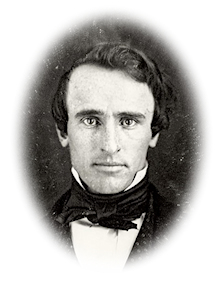
COLUMBUS, April 19, 1861.
DEAR UNCLE:–I came up last night to help Dr. James Webb get a place as surgeon, and for other purposes not war- like. The doctor left for the East as assistant surgeon of [the] Second Regiment with the soldiers this morning. I shall return home on [the] next train.
At the first, I put down my foot that I would not think of going into this first movement. This, of course, I shall stick to; but if this war is [to] go on, it is obvious that sooner or later thousands will be dragged into it who would now not contemplate doing so. Platt enjoys it hugely. So do all the old-style people who like a strong government. It took a great many delicate youngsters from our neighborhood; almost every other family on our street sent somebody–Wilson Woodrow, Wright, Schooley, of our near neighbors. I saw them in their tents last night–cold as Halifax, and compelled to get up at 2:30 this morning to go East. A sharp experience for tenderly reared boys.
Come down and see us. All well here.
Sincerely,
R. B. HAYES.
S. BIRCHARD.
Pensacola and not (Fort) Pulaski is the point.—Confederate Secretary of War
April 19, 2021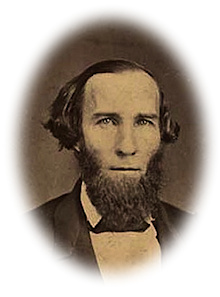
MONTGOMERY, April 19, 1861.
General BRAGG, Pensacola:
Events are such as to excite belief that demonstrations may be made upon you at an early day. I would, therefore, advise increased vigilance in preventing possible communication with the fleet or Fort Pickens. Martial law should be rigidly enforced. Everything is being done to send you guns and artillerists. We are badly off, however, especially in this latter particular.
L. P. WALKER.
—–
MONTGOMERY, April 19, 1861.
J. E. BROWN, Milledgeville:
Have just received your letter of the 18th instant. You are mistaken about the fleet. It lies off Pensacola. Am willing to do anything necessary to defend Savannah and its approaches, but think you will concur in opinion that your suggestion is not now necessary. Pensacola and not Pulaski is the point. This is certain.
L. P. WALKER.
—–
MONTGOMERY, April 19, 1861.
General BRAGG, Pensacola:
Do you need for any purpose more troops than you have?
L. P. WALKER.
—–
MONTGOMERY, April 19, 1861.
General BEAUREGARD, Charleston:
Send to Pensacola the workman who planned and Captain Hamilton who superintended the construction of your floating battery. Hope you will do so at once. Mortars very much needed at Pensacola, and I hope you will send as many as possible, and without delay.
L. P. WALKER.
Proclamation of a Blockade
April 19, 2021
April 19, 1861
By the President of the United States:
A Proclamation.
Whereas, An insurrection against the Government of the United States has broken out in the States of South Carolina, Georgia, Alabama, Florida, Mississippi, Louisiana, and Texas, and the laws of the United States for the collection of the revenue cannot be efficiently executed therein conformably to that provision of the Constitution which requires duties to be uniform throughout the United States.
Events Diary, April 19, 1861
April 19, 2021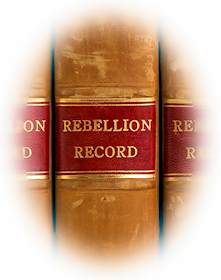
–A meeting of the merchants of New York city was held at the Chamber of Commerce. The proceedings were characterized by the utmost harmony and unanimity. Mr. Peletiah Perit occupied the chair, and patriotic speeches were made by Mr. Perit, George Opdyke, James Gallatin, Royal Phelps, S. B. Chittenden, Prosper M. Wetmore, George W. Blunt, John E. King, William E. Dodge, John A. Stevens, R. H. McCurdy, and others. Resolutions upholding the Federal Government, and urging a strict blockade of all ports in the secession States were unanimously adopted. It being announced that several of the regiments needed assistance to enable them to leave–on motion, a committee was appointed to receive donations, and in ten minutes the subscription had reached over $21,000. What was still more important was the appointment of a large committee of the most influential capitalists, to use their exertions to secure an immediate taking of the $9,000,000 remaining of the Government loan.–(Doc. 66.)
–The President of the United States issued a proclamation, announcing the blockade of the Southern ports.–(Doc. 67.)
–Sherrard Clemens, a strong Union man, and late member of Congress for Richmond, Va., is held as a prisoner at Richmond. He is still firm in his loyalty to the Government and his opposition to rebellion. –Tribune, April 19.
–At Wilmington, Ohio, the first volunteer company, consisting of 125 men, organized today. Three thousand dollars were subscribed in one hour for the benefit of volunteers. Great enthusiasm prevails, and the work goes bravely on in raising both men and money. Another company is forming. A suspected Secessionist was seized this evening, and experienced some rough treatment.–Louisville Democrat, April 21.
–A rifle company was organized at Dayton, Ohio, under command of Captain Childs, consisting of 75 picked men. The company left Columbus at noon to-day, amid the cheers of a large crowd of citizens. Home guards are being formed. One company is to be formed of men over forty-five years old, under the command of Edward W. Davis.–Idem.
–Rev. Warren Swift; of Utica, N. Y a Presbyterian minister of excellent abilities and wide-spread reputation, enlisted, and started for head-quarters this morning.–Idem.
–General Sherman, the State commandant at Galveston, Texas, issued an order enrolling “all citizens capable of bearing arms, not over sixty years of age, who do not enroll themselves into some one of the volunteer companies of the city by the 28d inst., in the militia. In case of being called into service they will be required to bring such arms as they may have, until they can be furnished by the State.
“The war has begun! It may reach our shores! Who in Texas will shrink from his duty in such a crisis? We invoke the spirit not only of 1776, but of 1836, to arouse from its slumber, and again assert the independence of Texas. The misrule of Black Republicanism would scarcely be less fatal to our interests than that of Mexican intolerance. We have shaken off the one; let us manfully repel the other.”
The order is accompanied by other similar ones, necessary to carry it into effect. The alarm signal for the assembling of the city troops will be first a fire alarm, and secondly after an interval of one minute, six taps of the bell, to be repeated four times with intervals.–N. O. Picayune, April 23.
–It is now learned by the return of the expedition to relieve Sumter, that a plan was perfected to throw in 300 men and supplies by boats at daylight on the 13th. This was frustrated, however, by the Baltic running upon Rattlesnake shoal on the night of the 12th.–World, April 19.
–Maryland, Delaware, and Pennsylvania, were added to the Military Department of Washington.–(Doc. 68.)–Times, April 25.
–A positive announcement “that General Scott had resigned his position in the army of the United States and tendered his sword to his native State–Virginia,” was made at Montgomery. At Mobile, one hundred guns were fired in honor of his resignation.–Charleston Mercury, April 22.
–Immense Union meetings were held last night at Auburn, Hudson, Ogdensburgh, Albion, Binghamton, and other towns and villages in western New York. Past political differences are forgotten, and the people are enthusiastic in support of the Administration.–Troy Times.
–At New York a large American flag, forty feet long by twenty wide, was flung out upon a flagstaff from a window in Trinity steeple, at a height of 240 feet. The chimes meanwhile played several airs appropriate to the occasion, among which were “Yankee Doodle,” “the Red, White, and Blue,” winding up with “All’s well.” The enthusiasm of the large concourse that had spontaneously gathered was most intense.
A flagstaff, with flag attached, was also run out of a window over the portico in front of St. Paul’s Church.–Tribune, April 20.
–A Portion of the Sixth Massachusetts, and the Seventh Pennsylvania, were attacked in the streets of Baltimore by a mob upon their passage through that city.
The Massachusetts Regiment occupied eleven cars. Upon their arrival at the President-street depot, the cars were permitted to leave with the troops still on board, and proceeded quietly through the streets of Baltimore, on their way to the depot at the other side of the town. But they had not gone more than a couple of blocks before the crowd became so dense that the horses attached to each car were scarcely able to push their way through. At this point the mob began to hoot and yell frightfully, and loud threats were uttered against the military. The troops, however, maintained a strict reserve, and the crowd then commenced to throw stones, brickbats, and other missiles, in a perfect shower, against the cars. Many of the troops were severely wounded in this manner. However, the first nine cars reached the depot, and departed for Washington. The remaining two cars of the train, with about 100 men, were thus cut off from the main body, and the men found themselves encompassed by an infuriated mob of over 8,000. These isolated cars were immediately attacked, and several of the soldiers had their muskets snatched from them. At this moment news came that the Philadelphia Volunteers had arrived, and the report excited the mob to a fearful degree. The road was now obstructed, and the soldiers alighted, formed a solid square, and advanced with fixed bayonets in double quick time, the Mayor of Baltimore at their head, all the while surrounded by the mob–now swelled to at least 10,000. The military behaved admirably, and still abstained from firing upon their assailants. The mob now commenced a perfect shower of missiles, occasionally varied by a random shot from a revolver or one of the muskets taken from the soldiers. The soldiers suffered severely from the immense quantity of stones, brickbats, paving-stones, &c.; the shots fired also wounded several. When two of the soldiers had been killed, and the wounded had been conveyed to the centre of the column, the troops at last, exasperated by the treatment they had received, commenced to return the fire singly, but at no one time did a platoon fire in a volley.
The volunteers, after a protracted and severe struggle, at last reached the depot, bearing with them in triumph their killed and wounded, and immediately embarked.
Two of the Massachusetts men were killed and eight wounded. Seven rioters were killed, and many wounded, but the number is not known. When information was received at the depot of this attack, the Pennsylvania regiment, which was unarmed, was sent back. Some were slightly wounded.–Times, April 20, 21
The mob completely reigned in Baltimore after the attack.–All the gunshops were plundered. Other shops throughout the city were closed.–A public meeting was held in the afternoon, at which the Mayor and Gov. Hicks were present.–Secession sentiments prevailed.
The Mayor and Governor both notified the President that no more troops could pass through Baltimore unless they fought their way.–(Doc. 69.)–Times, April 21.
–Boston was terribly excited at the attack on the Massachusetts troops in Baltimore. The Government recognizes the similarity in the day and event suggested by the 19th of April, 1776, and those immortal memories which cluster around the men of Lexington and Concord.
The Governor sent the following despatch to the Mayor of Baltimore:
I pray you cause the bodies of our Massachusetts soldiers, dead in battle, to be immediately laid out, preserved in ice, and tenderly sent forward by express to me. All expenses will be paid by this Commonwealth.
John A. Andrew,
Governor of Massachusetts. –(Doc. 70.)
At Fall River, Mass, a meeting was called on the reception of the news. Patriotic speeches were made, and the city government was instructed to appropriate $10,000 to fit out volunteers, and to pay each volunteer $20 per month in addition to the Government pay.–Providence Journal.
–The City Council of Philadelphia, this morning, at a special meeting, appropriated $1,000,000 to equip the volunteers and support their families during their absence from home. Fourteen thousand dollars were subscribed for the same purpose at Norwich, Conn.–N. Y. Times.
–The Seventh Regt., N. Y. S. M., left for Washington amid the greatest enthusiasm. In every street an immense innumerable throng cheered them on their way. News of the fight in Baltimore was received before they left, and 48 rounds of ball-cartridge were served out.–(Doc. 71.)
Lieut. Jones, late in command of Harper’s Ferry, arrived at Carlisle Barracks, Pa., Laving made a forced march the previous night of 30 miles from Harper’s Ferry to Hagerstown.–Times, April 20.
–The Rhode Island Marine Artillery passed through New York, on their way to the seat of war. These troops are officered by–Commanding Officer, Colonel Tomkins; Lieutenant Colonel, George C. Harkness; Captain, Benjamin F. Remington; Lieutenant, A. M. Tower; Lieutenant, Henry B. Brastow; Surgeon, Nathaniel Millar. They number 130 men, and carry with them 110 horses, eight guns of very heavy calibre, and the other requisite arms and ammunition. The horses are fine, spirited-looking animals, and appeared to be in that condition which will enable them to sustain a good deal of field hardship.–Herald, April 20.
–The Eighth Regiment of Massachusetts Volunteers, under command of Colonel Timothy Munroe, passed through New York on their march to the south. It is composed of six companies: Newburyport Artillery, Newburyport Light Infantry, Gloucester Artillery, Lynn City Guards, Capt. Hundson, Lynn Light Infantry, Capt. Frazer, Lafayette Guards, Marblehead, Capt. Orne, all of Essex County, numbering twelve hundred. They are all picked men, those of Gloucester and Marblehead being stout and sturdy fishermen; those from Lynn and Newburyport chiefly shoemakers. Many of the members of the two Lynn companies served throughout the Mexican campaign. All of the men were in the best of spirits. Brig.-Gen. Benj. F. Butler and Quartermaster John Moran, of Boston, accompany the Regiment.–(Doc. 72.)–N. Y. Tribune, April 20.
Civil War Day-By-Day
April 19, 2021April 19, 1861
- Virginia forces take control of Harpers Ferry
A Chronological History of the Civil War in America1
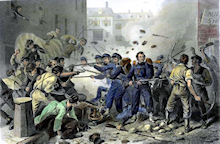 Attack on the 6th Massachusetts Regiment at Baltimore, of which two were killed and seven wounded. Eleven of the rioters killed and many wounded. Baltimore in the hands of the mob, and the mayor informed the President that no more troops could pass through the city without fighting their way.
Attack on the 6th Massachusetts Regiment at Baltimore, of which two were killed and seven wounded. Eleven of the rioters killed and many wounded. Baltimore in the hands of the mob, and the mayor informed the President that no more troops could pass through the city without fighting their way.- New York Seventh left for Washington.
- President of the United States issued a proclamation declaring a blockade of the ports of the seceded States, viz.: South Carolina, Georgia, Alabama, Florida, Mississippi, Louisiana, and Texas.
- A Chronological History of the Civil War in America by Richard Swainson Fisher, New York, Johnson and Ward, 1863
To the People
April 18, 2021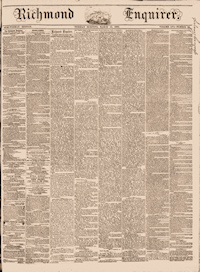
Richmond Enquirer
April 18, 1861
CHARLES CITY COUNTY, APRIL 16, 1861. To the People of New Kent, Charles City, James City, York, Warwick, Elizabeth City and the City of Williamsburg:
I published, during the month of October last, in the Richmond Whig, a card, indicating that I would be a candidate, at the ensuing election, to represent you in the Senate of Virginia.
Since that time, the whole political aspect of the country has changed, and it becomes me to announce to you my position as to the course that Virginia should have taken in the crisis which is upon her. I conceive that there is but one practical question in all this matter, to-wit: Where will she go? There are two Confederacies. One is her natural ally—with equal sympathies, similar institutions, and interests alike—the other is the avowed enemy of her domestic peace. One invites her with open arms and a full heart; the other repulses her overtures of conciliation and compromise with insult added to injury. She must decide—not which she will serve—but which she will encourage, protect end defend. For myself, I do not hesitate. I would have her unite her destiny, for weal or woe, with that of her Southern sisters and briefly, for these, among many reasons:
- The prosperity and progress of the Southern States depend upon the permanency of the Institution of African slavery.
- The permanency of this institution depends upon a present and final settlement of the question by placing it entirely under the control of the South.
- That control can never be acquired in a government, a large majority of whose people have been tutored to believe that slavery is a curse, and that they are responsible for its existence.
- The whole moral power of the State will be thrown into the scale of the institution. Her people will be united in its defence, and the question of Virginia emancipation left to be discussed when many generations have passed away.
- The commercial depression that afflicts a country will continue and culminate in rule if an adjustment is not speedily effected. Can Virginia hope for this by temporizing with those of whom she seeks redress?
- Many of the advantages of the old Government will be secured by treaty, &c., whilst the cause of strife will be removed.
- The honor of Virginia, her past fame, her present high character, and promise of future power demand that she shall take this step.
She will by so doing preserve the peace of the country. A united South will not be warred upon by the Republican horde at Washington. Virginia will carry with her the border States, and when they, with her, shall have added eight more stars to the flag at Montgomery then will the question of peace or war, of prosperity or depression have been settled.
I hope to be able to discuss this question throughout the District. Allow me to add, in yielding to the wishes of my friends by thus announcing myself as candidate for this important post, that, if elected, I shall strive to reward your confidence by an earnest devotion to your interests and Virginia.
Very respectfully, &c,
April 16—. ISAAC H. CHRISTIAN
From Washington City.
April 18, 2021
Richmond Enquirer
April 18, 1861
WASHINGTON, April 17.—It is reported, but as yet unconfirmed, that the Government has called out 150,000 additional troops. It is also stated that the corps of Engineers have selected positions for the erection of batteries in and around Washington for the protection of the city.
Col. Chas. Lee, and Adjutant-General Jones of the District militia threw up their Commissions today.
The Rhode Island volunteers have been ordered to Washington.
The veteran Captain Stuart of the splendid Georgetown cavalry has resigned.
Every public building in the city is now openly guarded day and night by the enlisted soldiers. The street in front of the Post Office is piled well with provisions in barrels and boxes, and guarded. An ammunition train passed the avenue today toward Georgetown, probably to supply the battery said to be erected on the heights of Georgetown.
The Light Artillery tonight are on the Maryland side guarding the approaches to the city.
Mr. Carrington, former Virginia District Attorney, is here; also J.M. Fleming former Attorney for Eastern Tennessee
Latest By Telegraph—The News From Washington.
April 18, 2021
Charleston Mercury
April 18, 1861
(From Our Own Correspondent.)
WASHINGTON, April 17.—The National Intelligencer of this morning throws off the mask, and comes out boldly in favor of coercion.
The streets are lined with the military—regulars and volunteers—and squads are seen everywhere anxiously discussing the probable action of Virginia. It is the impression here that had the Border States seceded promptly after the organization of the Confederate States Government there would have been no collision. As it is, the preparations for subjugating the South are pushed steadily forward, although many of the leading Republicans seem startled at the first results of their own policy.
Sympathy for the Southern movement is fast on the increase in this District, and the Administration scarcely knows whom to trust.
It is currently stated, although the rumor lacks confirmation, that the Government will shortly call for a levy of 150,000 additional troops from the States. Of course they must all be got from the North. The army Engineers in the Arsenal, which commands the approach to this city by the Potomac river, are busily engaged devising plans and choosing their positions for the defence of the city from the dreaded attack by the Southern troops.
THE LATEST.
WASHINGTON, April 17—9 1/2 p.m.—The Administration is exultant over the war feeling in the North, and LINCOLN says, bluntly, that the South shall have war just as long as the Free States will furnish the men and money.
Gen. SCOTT proposes to concentrate 35,000 men at this point; 25,000 at St. Louis; 5000 in Western Texas; 25,000 at Fort Pickens; and 1000 to cruise off the coast of the Carolinas. It is generally believed that his suggestions will be acted on.
The most feverish anxiety is manifested to hear news from Richmond. LINCOLN fully anticipates the secession of the Old Dominion, and fears that from that quarter the thunder and the lightning may come together.
The necessary orders will be issued tomorrow to throw heavy reinforcements in Fort McHenry, near Baltimore. This move, it is hoped, will keep Maryland quiet.
Latest by Telegraph. The News from Montgomery. —Proclamation by President Davis
April 18, 2021
Charleston Mercury
April 18, 1861
MONTGOMERY, April 17.—The Proclamation of LINCOLN having at last been received here in a form sufficiently authentic to leave no doubt of its being genuine, President DAVIS has in turn issued today the following highly important and spirited Proclamation.
PROCLAMATION.
BY THE PRESIDENT OF THE CONFEDERATE STATES OF AMERICA.
WHEREAS, ABRAHAM LINCOLN, the President of the United States has, by Proclamation, announced the intention of invading this Confederacy with an armed force for the purpose of capturing its fortresses, and thereby subverting its independence, and subjecting the free people thereof to the dominion of a foreign power; and whereas it has thus become the duty of this Government to expel the threatened invasion, and to defend the rights and liberties of the people by all the means which the laws of nations, and the usages of civilized warfare, place at its disposal:
Now, therefore, I, JEFFERSON DAVIS, PRESIDENT OF THE CONFEDERATE STATES OF AMERICA, do issue this my Proclamation, inviting all those who may desire, by service in private armed vessels on the high seas, to aid this Government in resisting so wanton and wicked an aggression, to make application for commissions or Letters of Marque and Reprisal, to be issued under the Seal of these Confederate States.
And I do further notify all persons applying for Letters of Marque, to make a statement in writing, giving the name and a suitable description of the character, tonnage and force of the vessel, and the name and place of residence of each owner concerned herein, and the intended number of the crew, and to sign said statement and deliver the same to the Secretary of State, or to the Collector of any port of entry of these Confederate States, to be by him transmitted to the Secretary of State. [continue reading…]
Richmond, Virginia, 2 dollars, April 19, 1861
April 18, 2021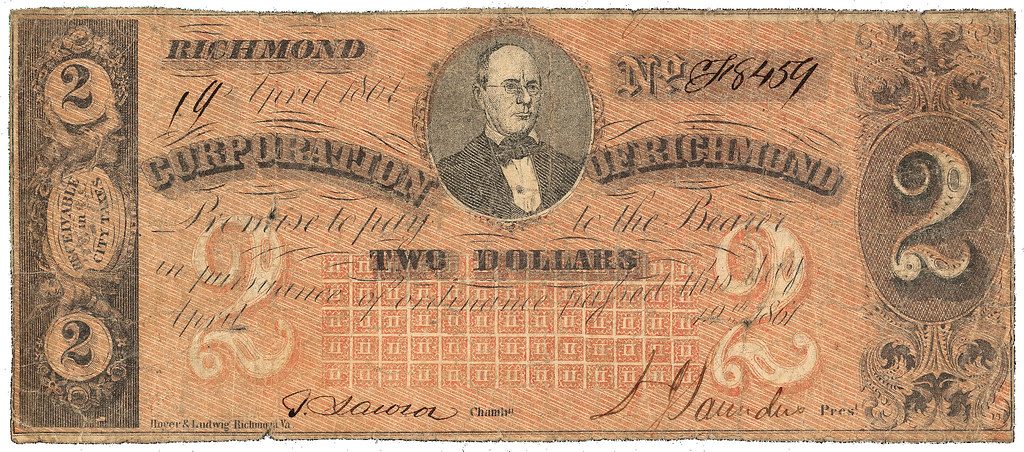 Title
Title
Corporation of Richmond (Virginia), 2 dollars, 1861
Author / Creator
Hoyer & Ludwig, Richmond [producer]
Creation Date
1861
Edition
Virginia, 1861
Description
Printed on white paper in red and black ink. Images include complex background pattern in red ink and a portrait of John Letcher. Verso: blank.
Materials/Techniques: ink on paper
Materials/Techniques: paper
Dimensions: 7.4 x 17 cm.
Notes
General: Note in manuscript: issue number “[ ]8459” and signatures of the Chamberlain and President in brown ink.
Subject: Civil War era currency
Inscription: “RICHMOND 19 April 1861 CORPORATION OF RICHMOND Promise to pay to the Bearer TWO DOLLARS in pursuance of ordinance passed this day April 19 1861”.
Subject
money ; Paper money ; bills of exchange ; patterns (design elements) ; portrait medallions
Form / Genre
currencies
engravings
Associated Name
Letcher, John, 1813-1884 [associated name]
Corporation of Richmond, Virginia [associated name]
Virginia [associated name]
Related Work
part of American Currency Collection
Related Information
Development of American Capitalism–Money and banking
Repository
Baker Library Special Collections, Harvard Business School
Note: The reverse side has no printing.
The War News.
April 18, 2021
Charleston Mercury
April 18, 1861
The News conveyed to our despatches this morning is important. While the LINCOLN Administration is rapidly concentrating the hungry hordes with which it proposes to subjugate the South, and draining the pockets of the anxious stock-jobbers who have staked their all in the success of the mad scheme of coercion, the President of the Confederate States meets the threatened invasion promptly and with vigor. In a Proclamation issued yesterday, he announces that letters of marque and reprisal will immediately be issued, under the authority of the Government, to armed vessels cruising as privateers upon the high seas. Northern cupidity is thus arrayed against Northern fanaticism, and it is not difficult to predict the result.
The valorous Yankee, led by the scent of the rich prey, will not long scruple, under the sanction of the Southern flag, to sweep from the seas the commercial marine of his Yankee neighbors. How long the shipping interest of the North will care to sustain the terrible risk which begins today remains to be seen.
If, however, this measure should not suffice to check the impudent pretensions of the abolitionized North to hold a free people in subjection, the Confederate States are ready to try other and more direct remedies.
Visit to Fort Sumter.
April 18, 2021
Charleston Mercury
April 18, 1861
Yesterday morning Mr. RUSSELL, the correspondent of the London Times, now in this city, visited Fort Sumter. He was accompanied by Colonel MILES, Colonel CHESNUT, Colonel MANNING and Colonel WHITING, Aids to General BEAUREGARD, and Colonel LUCAS, Aid to Governor PICKENS. Mr. FONTAINE, of the New York Herald, and others, were of the party.
Our Montgomery Correspondence.
April 18, 2021
Charleston Mercury
April 18, 1861
MONTGOMERY, April 15.
The excitement in this city since the first gun was fired at Fort Sumter, has been great, and every facility for obtaining news is grasped at eagerly. The bulletin boards at the newspaper offices are besieged at all hours of the day, and every despatch that leaves the telegraph office is watched with anxious eyes. On Sunday THE MERCURY was in great demand, and large sums were offered for a single copy containing the account of the battle. When a telegram announced that the Confederate flag was raised upon Sumter, a salute was fired, and amid the shouts of thousands, several flags were hoisted in various parts of the city. Never in our history has there been so much enthusiasm on one day; and never has the public mind been raised to such a pitch of excitement. One can imagine what a relief it was to hear that the gallant Carolinians were victorious, and the long pent up emotions burst forth in tumultuous cheers. This victory has given us additional confidence in the courage and patriotism of our brave volunteers who have so nobly come forward to drive the invaders from our shores.
Notwithstanding a thousand rumors all afloat in the street, there is very little of interest that I can get, which is well authenticated. The Commissioners came here this morning, and have been closeted with the President and Cabinet nearly all day. Mr. CRAWFORD is now at his home in Columbus, Georgia. The official correspondence between them and the Federal Government is expected here tonight by ADAMS’ Express. It will be published as soon as it comes to this city, as well as the Address of the Commissioners. Thus far nothing has been learned outside in regard to their acts, beyond that already known from Washington despatches.
Yesterday evening the steamer King came up the river, having on board Mrs. President DAVIS. Seven guns were fired from the King upon her arrival at the levee, in honor of the news from Fort Sumter. Mrs. DAVIS is now stopping at the Exchange Hotel, where she will remain until the White House is ready. [continue reading…]
A Full Account
April 18, 2021
Charleston Mercury
April 18, 1861
A FULL ACCOUNT of the Battle of Fort Sumter, with all the stirring incidents of the bombardment and subsequent surrender, has been compiled in a complete form, chiefly from the very full and interesting details published in the journals of this city, and will be issued from the press of Messrs. EVANS & COGSWELL this afternoon. It may be had tomorrow morning at the bookstores and principal news depots. This graphic and highly interesting history of the reduction of the greatest stronghold of our harbor will doubtless be eagerly sought for by all, and carefully preserved by those who have shared in the glory of the achievement.
Female Volunteers.
April 18, 2021
Albany Patriot
(Georgia)
April 18, 1861
The Holly Spring Herald learns that the county of Chickasaw, Miss., has ten companies of volunteer soldiers ready to be mustered into the service of the State. It adds that, in addition to these:
“The county has a regularly officered and drilled company of young ladies, who have pledged themselves, in the event that the men are called into service, to protect their homes and families during their absence, and see that the farms are properly cultivated, and full crops raised not only for the support of the county, but the army of Mississippi.”
